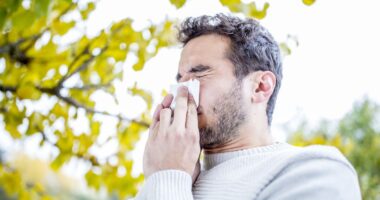Since being diagnosed with a potentially deadly rare allergy condition a little over two years ago, James Giddings has lived in a state of ‘constant vigilance’.
The father-of-three wears gloves most days and won’t shake hands with anyone. When his children tumble home from school, they must be carefully washed before he can risk hugging them.
Unfamiliar bathrooms are used only in an emergency and he no longer visits the hairdresser. And needing any kind of medication is a potential minefield which could kill him.
The 39-year-old music manager from London knows any slip could trigger a serious reaction known as anaphylaxis. This would cause his throat to swell, his blood pressure to plummet and trigger potentially fatal breathing problems.
The culprit? A chemical so commonplace it is in everything from soap and shaving gel to shampoo, toothpaste and even the coating on ibuprofen tablets.
James is allergic to polyethylene glycols – or PEGs – also known as macrogols. Most commonly described as a PEG allergy, its most serious form affects just a handful of people in the UK. Since it has only recently been identified, doctors can’t work out why it occurs or who might become affected.
It came to broader attention during the Covid pandemic after a small number of suspected anaphylaxis reactions were reported by people after they had the Pfizer or Moderna vaccines, which contained PEGs.
Since then, more people have reported a sensitivity to many products containing PEGs lurking in household cupboards, causing milder symptoms such as an itchy rash and itchy eyes.

James Giddings, pictured with one of his three children, lives in a state of constant vigilance
After The Mail on Sunday’s GP columnist Dr Ellie Cannon wrote about it in her column last month, several readers contacted her to say they had also been diagnosed – and that it was ‘not something to be taken lightly’.
James says: ‘It has been life-changing for me. Everywhere I go, I carry three EpiPens [life-saving allergy medication], antihistamines and steroids, as without them I could die.
‘I don’t shake people’s hands. I don’t cuddle people, even when the kids come back from school because PEG is in glue sticks.
‘That has an impact on your mental health. That constant vigilance to be aware of everything around you is devastating and I’m having therapy to deal with it better.’
For James, the problems began in January 2023 when he was given a liquid laxative at a private London clinic ahead of an MRI for an unrelated abdominal issue.
Immediately his hands and feet developed a burning sensation, his eyes, nose and throat started tickling, he broke out in hives and he felt an overwhelming sense of doom – a common early sign of anaphylaxis.
The clinic gave him intravenous steroids, antihistamines and adrenaline, and he was taken to St George’s Hospital in south London.
It was discovered that the laxative contained a high dose of macrogol, a concentrated version of polyethylene glycol, and tests confirmed his PEG allergy.

James pictured at the Brit Awards in February 2023, knows any slip could trigger anaphylaxis
Dr Shuaib Nasser, a leading expert on PEG allergy at Cambridge University Hospitals NHS Foundation Trust, says most cases emerge when people take laxatives or bowel preparations for medical procedures, or from steroid injections, which involve higher doses of PEGs, rather than from cosmetics or household products.
‘This is one of the rarest allergies we come across – over 25 years, we’ve identified around seven cases,’ he says. ‘The mildest reaction is hives and the most serious is full-blown anaphylaxis. We know of at least two deaths.’
It is not easy to avoid products containing PEG as it can be labelled as macrogol, polyethylene oxide or polyoxyethylene, or may not be on the label at all.
Andrew Shaw, 53, who suffered from a PEG allergy, died in 2019 at Kettering General Hospital in Northamptonshire during a heart operation. His surgeon had ‘taken every precaution’ and asked staff to check all products for PEG, but it was later found to be in the coating of some wires used for the procedure, which was not on the label.
Mr Shaw went into anaphylactic shock and could not be revived. The coroner called for clear ingredient labelling on medical packaging to prevent further deaths.
Dr Nasser says most sufferers will be fine when exposed to very small amounts of PEG, but that they should still avoid any products which contain it.
He adds that avoiding Covid vaccines was not necessary as they are thought to contain too few PEGs to cause anaphylaxis.
For James it pays to be cautious. He was recently hospitalised again after a serious reaction in a German airport when he opened a packet of headphones.
‘This rubber-stamped the idea that this was something I have to live with and it could happen anywhere,’ he says.
‘I’m determined to raise more awareness of this because, at the moment, you can’t trust anything or anyone.’
Anaphylaxis UK has fact sheets on PEG and many other allergies (anaphylaxis.org.uk).









